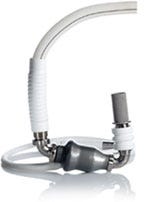St. Jude Just Got Another Reason to Really Like LVADs
July 29, 2015
Thoratec's attractiveness to St. Jude Medical, and potentially others, has likely grown after Mayo Clinic researchers found LVADs can help deadly restrictive cardiomyopathy patients.
|
HeartMate II, as shown on Thoratec's website |
Nancy Crotti
Left-ventricular assist devices just got a shot in the arm from a Mayo Clinic study showing that LVAD succeeded in treating patients with potentially deadly restrictive cardiomyopathy (RCM).
The study results' release comes a week after St. Jude Medical (Little Canada, MN). announced it would acquire Thoratec, a major LVAD player in the U.S. market. The $3.4 billion deal is expected to close by the end of the year, though the merger agreement gives Thoratec executives until August 20 to shop around for a better deal.
Could the Mayo study help lure in another suitor for Thoratec?
Approximately 500,000 people are currently living with cardiomyopathy, which is a condition that affects the muscles in the heart. RCM is a rare form of cardiomyopathy that limits the heart muscle from relaxing between beats when the blood returns from the body back to the heart. This causes the heart to pump weakly and restricts the flow of blood to the heart's chambers.
The study, published in the Journal of Heart and Lung Transplantation, suggests criteria that clinicians can use for successful implementation of these devices in RCM.LVADs help pump blood from the heart to the rest of the body.
The study included data from 28 patients with end-stage heart failure who were waiting for a heart transplant or were not transplant candidates. The patients received a continuous-flow LVAD between January 2008 and August 2013. Mayo cardiologists studied each patient's preoperative data, short-term postoperative events, and long-term results. They reported improved survival rates and fewer complications in patients who received an LVAD, whether or not they eventually received a heart transplant.
"While other studies have focused on risk factors associated with post-LVAD survival, this is the first study to focus exclusively on end-stage RCM patients and to identify the parameters associated with better outcomes," said Lyle Joyce, MD, a heart transplant surgeon and surgical director of Mayo Clinic's VAD program, in a Mayo press release. "For example, we have defined criteria such as size of the left ventricle, which is very important in determining outcome in these patients, suggesting that with careful selection we can offer these patients a much better outcome and eventual cardiac transplantation."
Thoratec's HeartMate II is touted as the most widely used and extensively studied left ventricular assist device. Earlier this year, the Pleasanton, CA-based company received FDA approval to enlarge its pivotal trial for its much-anticipated, next-generation HeartMate III.
Buying Thoratec fits in well with St. Jude Medical's "innovation-based growth strategy" to expand and enhance its established presence in heart failure therapies, St. Jude CEO Daniel J. Starks said in a news release.
The company already has quadripolar cardiac resynchronization therapy and remote monitoring capabilities. The CardioMEMS device, which St. Jude spent $375 million to acquire amid its FDA approval last year, is about the size of a paper clip and uses MEMS technology originally designed to monitor jet enginesto remotely monitor a heart failure patient's pulmonary artery pressure.
The deal will allow St. Jude to enter new markets worth more than $1 billion, a market that is expected to grow 10% a year, according to the companies. Both companies say they have strong relationships with heart failure physicians and cardiac surgeons, relationships they should be able to leverage for each other's products.
Refresh your medical device industry knowledge at MEDevice San Diego, September 1-2, 2015. |
Nancy Crotti is a contributor to Qmed and MPMN.
Like what you're reading? Subscribe to our daily e-newsletter.
About the Author(s)
You May Also Like



